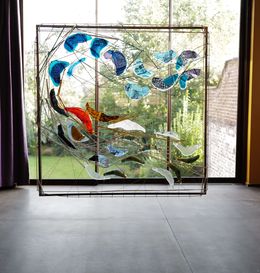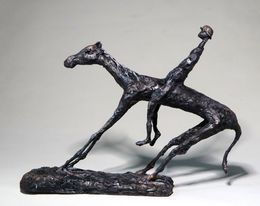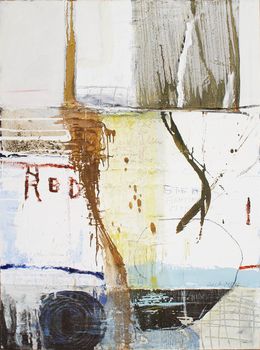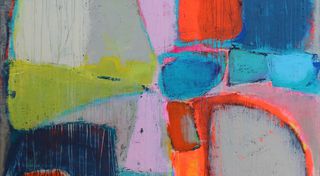
Meet the founders of the Nous Foundation
Meet the founders of the Nous Foundation: Leaders of a Francophonie revitalization

Scott Tilton + Rudy Bazenet on the porch of the Historic BK House & Gardens © Alexandra Kennon
Today, we delve into the captivating narrative of Scott Tilton and Rudy Bazenet, the visionary co-directors steering the Nous Foundation. Established in 2020, the Nous Foundation emerges as a beacon for cultural revitalization, anchoring Louisiana's French and Creole heritage along with Francophonie influences across the United States firmly in the 21st century. Notably, Artsper is proud to sponsor their latest exhibition, "Haiti-Louisiana: Tides of Freedom," in collaboration with the Historic BK House & Gardens and curator Max Jean-Louis. Join us as we uncover their journey, navigating the intricate tapestry of language classes, concerts, groundbreaking exhibitions, and much more.
1. Bonjour Scott and Rudy! Thank you for speaking with us today. Could you start by introducing yourself to our readers? How did the Nous Foundation come to be?
Scott: As we jokingly say in Louisiana, bonjour y'all! Rudy and I are a dynamic duo in life as husbands and professionally as co-directors of the Nous Foundation in New Orleans. Rudy and I met in Paris in 2016, where I was studying at Sciences Po, and he worked for the French Foreign Service and had just returned to Paris after several years in California and Slovenia. After we met, we launched and spearheaded an initiative that saw Louisiana become the first U.S. state to join an international organization, the Organization Internationale de la Francophonie (OIF), in 2018. I joke that the OIF is kind of like the French-speaking world's UN, representing over 88 countries and regions, now including Louisiana. I grew up in Louisiana with French, and working on having the state join the OIF reinforced to Rudy and me how many opportunities could be had through supporting the revitalization of French and Louisiana Creole, which are heritage languages that sadly declined from 1 million speakers in 1970 to about 120,000 today.
Inspired by the wonderful cultural institutions that surrounded us in Paris, we founded the Nous Foundation in June 2020 (just in time for Covid) and then moved to New Orleans. We were so fortunate to create a collaboration with an existing museum, the Historic BK House & Gardens, in the gorgeous French Quarter of New Orleans that hosts our activities for us. Three years later, we fortunately haven't looked back. Our work centers on cultural revitalization and showing that Louisiana's French and Creole are firmly anchored in the 21st century. So, we organize language classes, concerts, and exhibitions and even run an accelerator program. We're now thrilled to launch Haiti-Louisiana: Tides of Freedom with the Historic BK House & Gardens and incredibly talented curator, Max Jean-Louis. The exhibit commemorates the 220th anniversary of Haitian independence and explores the profound influence Haiti has had on Louisiana, as shown through contemporary art.
2. How did your past professional experiences lead you to the creation of the Nous Foundation?
Rudy: During my days with the French Foreign Service, I had the opportunity to specialize in cultural cooperation, including between France and the United States. I always had an idea of how much culture can build ties across communities. Through Scott, I learned about Louisiana through its food (it's spicy but delicious), people, and, of course, culture, including the arts and music. I know Scott worked in consulting with Ernst & Young France for a while, specifically on evaluating public policy. It was eye-opening for him to see how much the arts and culture were supported in Europe through public programs, specifically in France, which had such an impact on the quality of the culture being produced (think Fête de la musique or the Journées du patrimoine).
Our ambition with Nous is to provide a nonprofit cultural institution that can raise funds and support cutting-edge culture that is being done in French and Creole, in Louisiana, but also across the United States, as we just opened a chapter of our organization in Detroit as well. The elevator pitch we typically give for Nous is that it is a cultural center, a creative studio, and Francophone fund, that encapsulates the dozens of programs that we have launched, with the end goal of making sure our heritage cultures not only survive but also thrive in a new generation. And the model is working. It's new, especially for the Deep South, but there is a flourishing interest in French and Louisiana Creole, nationally and internationally. And we're excited that the Nous Foundation can provide both visibility and capacity for the movement as it finds its legs.


Left: Scott Tilton + Rudy Bazenet in the gardens of the Historic BK House & Gardens © Alexandra Kennon / Right: Rudy Bazenet on the porch of the Historic BK House & Gardens © Nous Foundation
3. What role does contemporary art play in the mission of your organization?
Scott: Contemporary art is a way to change the narrative and unleash creative energy that's been discouraged. I often say that New Orleans is as much a lifestyle as it is a place, and that lifestyle is enmeshed in the food, the music, and the visual arts. In our specific world of working on French, people don't realize that French was banned constitutionally from 1921 to 1974 in Louisiana as a primary language of education, along with other de facto and de jure discriminatory practices. As a result, we lost hundreds of thousands of native speakers as Jim Crow laws further divided communities based on an arbitrary, unjust policy of racial discrimination. The defeatism that our French and Creole-speaking cultures were destined to disappear can be fought through art, as you invite new generations to reconnect with their heritage culture through art.
Our first exhibit that we curated had a sort of sonic boom effect. It was called The Louisianais.e, a traveling exhibit featuring a fanciful magazine cover set in the year 2050. We invited eight artists, including BIPOC and queer artists, to protest discrimination and show how the loss of our cultures intersects with environmental racism and climate change. The pop art, with almost fanciful elements to the covers, helped change the narrative around the decline, as it offered a future for our cultures to be still alive. Since then, we have curated several other exhibits, including Haiti-Louisiana: Tides of Freedom. And speaking to the continued interest in our work, we are fortunate to have our exhibits still traveling and being seen across Louisiana, the United States, and even in France. And final point: we owe immense gratitude to all the artists who have entrusted their works with our exhibits, but we are so lucky to work with Katya Vaz and Autumn Palen, who are some of today's most promising artists.
4. How does the Nous Foundation work with other organizations across disciplines in the francophone community?
Rudy: We care deeply about French and Louisiana Creole, but our mission is broader than just language revitalization. We understand that the patterns of discrimination faced by communities that have spoken these languages are still present and pose an existential challenge to our communities, especially in Louisiana, where language loss and climate change along the coast go hand-in-hand. Because of our efforts to address and talk about this broader impact, we've been able to work with dozens of Francophone organizations worldwide that face similar challenges. For example, we are working with the Organisation Internationale de la Francophonie, the Centre de la Francophonie des Amériques, and the Haitian Resource Development Foundation on our upcoming exhibit. Three organizations in three countries with Francophone ties that work in different disciplines are helping us mount an exhibit in New Orleans on the ties between Haiti and Louisiana because of the exhibit's important messages around civil rights and language justice. This level of strengthening ties through the French language so that exquisite art can be showcased in the United States is so unique and firmly anchored in the modern revitalization movement for French that the Nous Foundation is trying to make thrive.
It's important also to mention that all the work we're doing is made possible through our collaboration with the Historic BK House & Gardens, a historic house museum in the French Quarter. It's a good example that we can work in a bilingual professional environment (French and English) without impeding our work. Another example of our working with other organizations across disciplines is through our Le Lab program, which supports heritage language speakers (including Cajun, Creole, and Indigenous communities) in setting up and sustainably funding their own nonprofits and companies. This is based on our understanding that bilingual job opportunities won't appear overnight, so we must nurture innovative ideas from the beginning and help create a community with the projects we've supported, spanning film, theater, and the visual arts.
5. Could you tell us more about the exhibition, Haiti Louisiana: Tides of Freedom?
Rudy: In direct collaboration with the Historic BK House & Gardens and Haitian-born curator, Max Jean-Louis, we are opening an exhibit of contemporary Haitian art entitled Haiti-Louisiana: Tides of Freedom, which will be on display at the Historic BK House & Gardens (1113 Chartres Street in the French Quarter) from January 12 to March 17, 2024. The exhibit will feature two groundbreaking collections: [1] the Jacques Bartoli Collection of Contemporary Haitian Art (consisting of 41 works) on loan from the Haitian Resource Development Fund in Miami and [2] original commissions by eight Haitian and Louisiana artists (consisting of 36 works), curated by Max Jean-Louis, exploring the ties between Haiti and Louisiana. The exhibition explores important themes between Haiti and Louisiana, including a shared colonial legacy, religious and cultural practices, and challenges such as inequality and climate change. The collection will bring together works across artistic media, including paintings, photography, and beaded flags (called drapo). Additionally, throughout the exhibition, the Historic BK House & Gardens and the Nous Foundation will organize conferences, concerts, and craft workshops with Haitian and Louisianan culture bearers for the public to learn about the important contemporary ties. We're thrilled to have New Orleans be in the global art community's spotlight this year through this exhibit. We have dozens of partners coming to town, including many people from Haiti and the Haitian diaspora. New Orleans was born in the Caribbean and raised in America – specifically born out of Haitian culture. And we're fortunate to organize such a wonderful exhibit to celebrate and question how those ties exist in the 21st century.


Left: Patricia Brintle, "Cécile Fatiman," acrylic on canvas / Right: Scott Tilton + Katya Vaz (Artistic Director, Nous Foundation) + Max Jean-Louis (Curator, Haiti-Louisiana: Tides of Freedom) © Nous Foundation
6. What advice would you give to someone looking to start their own organization?
Scott + Rudy: When you have a vision, don't doubt it, but never hesitate to let people share in that vision with you. Our vision of a world-class cultural institution dedicated to Louisiana's French and Creole-speaking cultures modeled off similar institutions we saw in Paris sustained our drive because it didn't exist in Louisiana and held the culture back. And that vision sustained our project in that first year when we were stuck in Paris due to COVID. Our future was uncertain as we had just left our jobs and had to fight tooth and nail to eventually get Rudy's visa. At times, people criticized our vision and thought we would never achieve our goals. But it was through supporting families, supporting communities, and people of all ages and communities who shared in our vision that helped us grow our project when we got home. Emblematic of this is the Historic BK House & Gardens. They are a well-established historic house museum and didn't have to be as generous as they were in letting us operate in their home. But their Director Annie Irvin and their Board saw how much our vision aligned with their mission and brought a truly groundbreaking collaboration to life. We owe so much to them. So, as you start an organization, believe in your vision, invite people to share in that vision, and search for opportunities in unexpected places because people want to help each other out.
7. What's next for the Nous Foundation?
Scott + Rudy: In 2023 we found our home in New Orleans, and in 2024 we want to project our work nationally. Last September, we had the unique opportunity to open a chapter of our organization in Detroit, Michigan, which is a unique community because there are historical ties to the French. But very importantly, there are French Canadians and more recently established communities from Lebanon, the Democratic Republic of the Congo, Burundi, and other Francophone countries that call the city home. We're excited to learn how to adapt our admittedly Louisiana-focused model to create an inclusive and welcoming space for Francophone and non-Francophones across the United States. And we're, of course, looking forward to growing our programs here in Louisiana. Our Le Lab accelerator program has raised $80,000 for 8 projects over two years, and we had the opportunity to welcome two scholars from France to Louisiana thanks to our Fulbright program. Imagine what we can achieve for the local economy and culture if we become a major actor in supporting cultural bearers here in the Deep South. Sometimes, the most unexpected answers emerge in far-flung places, and we are excited New Orleans and Louisiana can nurture its French and Creole-speaking cultures to overcome injustices and spread a vision across the United States.
Their favorite artworks

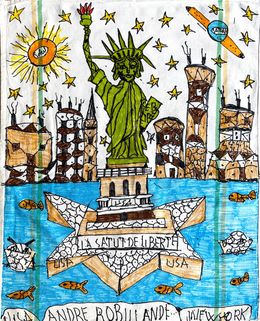
André Robillard
Fine Art Drawings - 69 x 54 x 1 cm Fine Art Drawings - 27.2 x 21.3 x 0.4 inch
$3,569



Oyewumi Oyindamola
Fine Art Drawings - 101.6 x 71.1 x 2.5 cm Fine Art Drawings - 40 x 28 x 1 inch
$4,500


